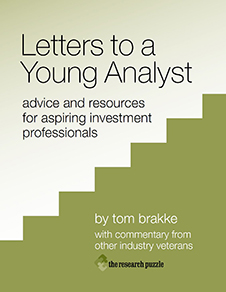
- Thursday, January 13th, 2011
- valuation debates
-
“What’s it worth?”
There are those who don’t really try to answer that question. While some momentum strategies have a valuation overlay, most do not. And there are times when the relative performance derby causes fundamentally-oriented investors to toss their valuation discipline out the window. “As long as the music is playing,” as one infamous CEO put it.
But despite the difficulty (and what at times seems like futility) of the task, grappling with notions of what to pay or be paid for an investment is what makes the business go round. Truth be told, just as the mainstream media still drives much of the content of online conversations, so too do the pronouncements and orders of those who attempt to value securities create the waves of supply and demand in the markets that are then played by others. It’s fashionable to say, for instance, that sell-side analysts hold no sway any more, but they still frame the debate and move prices, although not to the extent they once did.
No matter your strategy, you may have ventured an answer to one recent valuation question: “Should Groupon have taken the six billion dollars?” For the record, my provisional answer is “yes,” since I don’t see its long-term competitive advantage versus others and don’t feel like the real dynamics at the consumer/retailer level are well understood yet.Harvard Business School | This article and comments on it bring out some of the issues. But my real opinion is, “I don’t know,” and therefore I probably shouldn’t speculate (with words or money).
Facebook is another company that draws us into the valuation game. Is it worth fifty billion or not? That number has supposedly been blessed by 50 Cent (he’s a hip-hop artist, Mom) and there are reports that the company’s goal is to be the first to reach a trillion dollars in value. Who am I to argue? But I do have some questions. Primarily, I want to know how usage is changing, since my limited sampling indicates that it is.Rick Bookstaber | My concerns are more immediate and less detailed than Bookstaber’s, but his posting is well worth a read. An installed base of the magnitude that Facebook enjoys is an incredible asset, but I’d need to know a lot more than I do now to plunk down my money. (FYI, Goldman never offered me the chance to buy the lottery ticket. For further musings on Facebook and Goldman, I recommend reading a posting by Aswath Damodaran.Musings on Markets | Damodaran is the most often cited “valuation expert.”)
More relevant to most of us is the debate about Apple’s valuation. For many, there is a disconnect between what the valuation ought to be and what it appears to be, with the health of Steve Jobs often being cited as the wild card that’s causing the perceived discount. This case seems ready made for the reverse engineering of “expectations investing.”Expectations Investing | This approach was popularized via the book of the same name by Alfred Rappaport and Michael Mauboussin. Since we can’t get a glimpse at Jobs’ medical chart (and I wouldn’t rely on the company to be especially forthcoming), finding a structured way to assess the embedded expectations is a good place to start. Given that the company garners more fascination and adulation than any other, there are plenty of forecasts and interesting theories to drive the analysis.asymco | Check out this posting and ninety comments for a range of possibilities.
These three firms have been hanging ten on the social/mobile wave. As with the dot-com era, our “touch” of the tools and infatuation with them can distort our perceptions, as was astutely pointed out by Michael Dawson, who said that “the cell phone is the most personal device ever, making it really hard for people to separate the device-maker from its stock.”The Reformed Broker | As quoted in this great compilation of things learned in 2010. And the valuations of the firms with the killer applications can be similarly hard to sort out for the same reason.
Thick books are written about valuation, but a few basics to keep in mind: Start with a deep knowledge of the business. (Many of the comments I see regarding these three companies seem to start elsewhere.) Consider a wide range of possible business outcomes and avoid single-point forecasts of any variables — look for the key sensitivities in the numbers. Admit what you don’t know and won’t know, so that you value the uncertainty as well as your beliefs. Then use a matrix approach, surveying by triangulation rather than a fixed point of view. And, by all means, have some sort of absolute valuation standards in the mix. If you don’t, you can justify anything. Then, let the debate begin.
